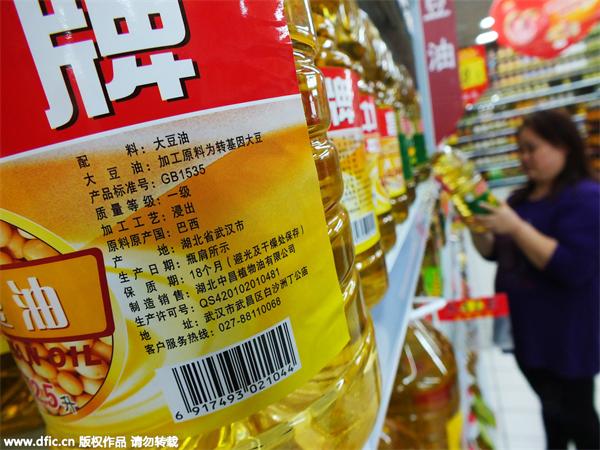 |
|
A kind of GMO cooking oil sold at a supermarket in Yichang, Hubei province. [Photo/IC] |
Increasing numbers of supposedly health-conscious consumers are choosing products with "free from" labels, from "BPA-free" plastics to "non-GMO" foods. But such labels do not increase public safety. On the contrary, not only are many of the scary-sounding ingredients perfectly safe, but manufacturers, in their haste to meet consumer demand, sometimes substitute inferior - or even harmful - ingredients or processes.
The blame for this situation lies mainly with activists and the news media for fanning unwarranted public fears. But a recent study shows how manufacturers, by drawing attention to what they are omitting from a product, perpetuate spurious concerns that actually drive consumers to take greater health risks.
The study explores, mainly through the lens of product labeling, how people evaluate the risks of bisphenol A (BPA) - a chemical that is commonly used to harden plastics and prevent the growth of bacteria in food cans - compared to its alternatives. It found that "people evaluate a situation in which scientific evidence is tempered by controversy similarly to a situation in which there is no scientific evidence at all". In other words, because there have been questions about the safety of BPA, people disregard the scientific evidence altogether.
Concerns over BPA should have been put to rest long ago. Years of research and repeated assessments conducted by government regulators - including one earlier this year by the European Food Safety Authority - have concluded that BPA is safe in normal use. It is the removal of BPA from the cans' lining, therefore, that may pose a threat to consumers' health, by leading to an increase in food-borne illnesses from deadly bacteria like Clostridium botulinum (which causes botulism).
Most people found out that BPA existed only when they saw a BPA-free sticker on bottles at their local store. But that label has a profound impact: it sends the unmistakable message that BPA is a health hazard. After all, if it were not, why would manufacturers not only exclude it from their products, but also tout that they had done so?
"What consumers do not know," the study's authors said, "is that BPA is often replaced with other, less-studied chemicals whose health implications are virtually unknown," and thus may prove to be worse than the original material. Yet people remain so focused on the BPA-free label that they accept these potentially "regrettable substitutions", exposing themselves to chemicals that they might otherwise reject.
GMOs (genetically modified organisms) face a similar stigma - one that compelled the American food-production behemoths General Mills and Post Foods to eliminate GMOs from their popular Cheerios and Grape Nuts brands, respectively. In trying to meet a perceived consumer demand, the manufacturers have had to make regrettable substitutions - namely, marketing products that lack some added vitamins. It is ironic that, in order to please their customers, they have begun offering inferior products at higher prices.
Of course, consumers are not the only ones whose inadequate consideration of the facts is resulting in regrettable substitutions. Governments, too, are making hasty, wrong-headed decisions that deny consumers a choice.
Consider the European Union's politically motivated decision to ban the state-of-the-art pesticides called neonicotinoids in 2013. Forced to resort to older, but more toxic and less effective, pesticides (primarily pyrethroids, which had been largely phased out), Europe's farmers are seeing a resurgence of insect predation. The damage may cause a 15 percent drop in this year's harvest of canola, the continent's primary source of vegetable oil used in food and biodiesel.
There are important lessons to be learned from such outcomes. When manufacturers and retailers allow their decisions to be guided by pressure from activists, not scientific evidence, they risk eventual consumer dissatisfaction and potential product-liability lawsuits. Likewise, policymakers should emphasize science over politics.
The public, too, has a vital role to play: maintaining a healthy skepticism regarding the claims of self-interested, self-styled "consumer advocates". Putting science first now is the best way to ensure that we, as consumers, have no regrets later.
The author is a fellow in Scientific Philosophy and Public Policy at Stanford University's Hoover Institution.
Project Syndicate

I’ve lived in China for quite a considerable time including my graduate school years, travelled and worked in a few cities and still choose my destination taking into consideration the density of smog or PM2.5 particulate matter in the region.